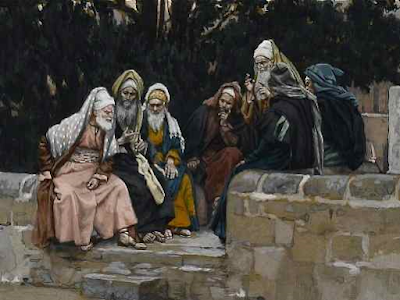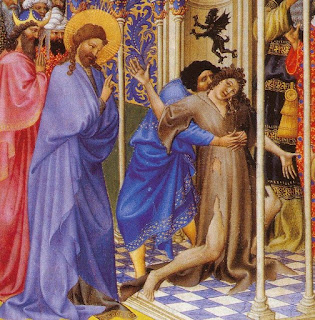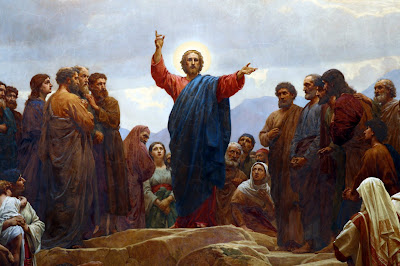Last Sunday, we resumed the continuous Sunday Gospel readings from Gospel of Mark from which we’ll be reading until November. Especially if you’ve never done so, I’d recommend sometime in the next week or two reading through the entire Gospel of Mark. With only about 11,000 words and the average adult reading speed being between 175 and 230 words a minute, it would take about an hour. An hour: to read one of the most important texts not only of our faith, but to civilization.
By reading it in one sitting, you will get a more cohesive understanding of Our Lord and Savior’s ministry and salvific mission. Mark's Gospel is structured in a way that builds momentum. So, reading it straight through will help you appreciate the urgency of Jesus’ message. And yet, Mark does not shy away from the fact that following Jesus, becoming his disciple, has a cost. And so you will also gain a deeper appreciation of how the disciples struggled and learned to follow Christ.
Mark highlights both the human emotions and the divine authority of Jesus, and so an uninterrupted reading will give greater insight into the mystery of the Incarnation—how Jesus is fully human and fully divine.
Coming to Sunday Mass every week, without missing, you will still only get a portion of Mark’s Gospel. So, if you’ve never read the Gospel straight through, there are lessons from Our Lord that you may never have heard before.
So, give yourself the gift of an hour reading through the Gospel of Mark in the upcoming week or so, you won’t regret it—it will deepen your faith, your hope, and your love.
The healing of the deaf-mute man in this Sunday’s Gospel is a great story in itself, and also within the broader themes of Mark’s Gospel. It highlights key aspects of Jesus' mission and His identity.
Throughout Mark's Gospel, Jesus is portrayed as the Messiah who brings about the Kingdom of God through his words and deeds. He is a man-of-action who backs up his teachings with miraculous works illustrating how Jesus has come to open us to the life of the kingdom of God. The healing of the deaf-mute man demonstrates how Jesus opens us—he opens our ears, he opens our mouths, he opens our hearts to the life of God—he has come to save us from those maladies which keep our minds, bodies, and spirits from the life God wants for us.
In the First Reading, we heard a prophecy of Isaiah, which foretold how the Messiah would open the eyes of the blind and clear the ears of the deaf. And St. Mark’s Gospel narrates so many healing miracles to prove that point—that Jesus Christ is the long awaited Messiah.
And yet notice where this miracle took place. The location of Jesus’ miracles is always significant. In today’s passage, he has left his headquarters in Capernaum, and even the surrounding villages of Judea. He has crossed the sea of Galilee with his disciples and has crossed to the eastern side of the sea of Galilee. This is significant i because it shows Jesus extending His ministry beyond the Jewish people to the Gentiles. Jesus is the Messiah not just for the Jews. Jesus fulfills God’s promise to bring salvation, not just to Israel, but to all people, of all places, of all times.
As the deaf man’s ears are opened, so too are the spiritual ears of all who follow Jesus. For Jesus helps us to hear God—to know that we are God’s beloved children, and that we have a God-given mission.
I’d like to consider how this Gospel has particular significance in this particular moment in Church history—during this final year of the Eucharistic revival, this Year of Mission
The deaf mute’s healing in this passage begins with Jesus' direct and intimate physical touch, as He places His fingers in the man’s ears and touches his tongue. This physical encounter mirrors how Jesus comes into real intimate contact with us, through the Eucharist. At Mass, we hear his words, we gaze upon his body and blood, and we physically receive Him.
And just as Jesus opened the ears of the deaf man, the Eucharistic encounter opens the hearts and souls of Catholics to our vocation to holiness and our vocation for heaven. Additionally, the Eucharist brings us healing. St. Ignatius of Antioch, our patron, called the Eucharist, the medicine of immortality. The Eucharist is medicine, it brings healing that nothing else in the world can bring, because the Eucharist is Jesus the healer, the bestower of the salve of salvation.
The healed man’s transformation—going from being deaf and mute to hearing and speaking—foreshadows the transformation that we undergo when we allow ourselves to be healed by Christ in the Eucharist.
In the Gospel story, Jesus addresses both the man’s physical need (his inability to hear and speak) and his deeper need for restoration. In the Eucharist, Jesus fully gives Himself to us, fulfilling the deepest hunger of the human heart—the hunger for God—to know God, to know that we are loved by God. That’s probably something that many of us take for granted, yet it’s something that much of the world is starving for.
And that leads us to Mission. The encounter with Jesus, the healing he works in us, the deepening of our union with him, the transformation he brings about in us, isn’t just so that we can stand around being holy, but the Eucharist propels us into the world to invite others to that fount of healing, transformation, and communion. The Eucharist renews us, but then sends us forth to be Christ’s hands, feet, and voice in a world that is spiritually deaf and in need of hearing the Good News.
So again, I invite you to read through the Gospel of Mark, in the upcoming days. It is a wonderful Gospel for this Year of Mission. It will deepen your faith, helping you to understand and experience more deeply the One who gathers us week after week around his table—to heal us, form us, and send us out for the glory of God and the salvation of souls.
















